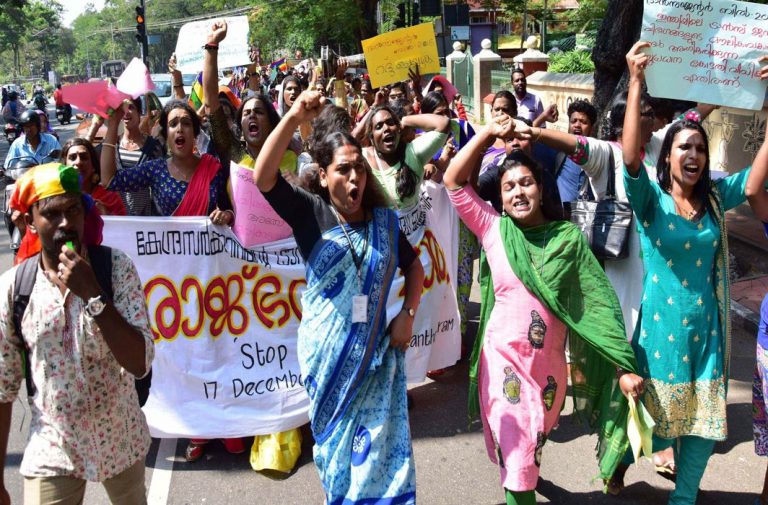
Above: Members of the transgender community staging a protest in Thiruvananthapuram/Photo: UNI
The Bill has many lacunae and does not completely protect various rights of the third gender, be it privacy, employment or fundamental rights
By Neha Bahl and Dr NK Bahl
The transgender community is one of the most marginalised in the country. It faces many problems ranging from social exclusion to discrimination, lack of education and medical facilities, unemployment and so on. Article 14 of the Constitution guarantees “equality before law” to all, while Articles 15 (1)(2) and 16 (2) prohibits discrimination on the ground of sex alone. And while Article 19(1)(a) ensures freedom of speech and expression to all citizens, discrimination and atrocities against transgender people continue.
National Legal Service Authority v. UOI (AIR 2014 SC 1863) is a landmark judgment of the Supreme Court as it declared transgender people as the “third gender”. The Court affirmed that the fundamental rights guaranteed under the Constitution will be equally applicable to transgender people and gave them the right to self-identification of their gender as male, female or third gender. This judgment is a major step towards gender equality in India. The Court held that because transgender people were treated as socially and economically backward, they should get reservations in admissions and jobs. The meaning of “transgender” is across or beyond sexual orientation. Gays, lesbians and bisexuals are not third gender.
Under the Transgender Persons (Protection of Rights) Bill, 2016, a transgender person can make an application to the district magistrate (DM) for issuing a certificate of identity as a transgender person. The DM will refer such an application to a district screening committee. The certificate of identity will be issued on the basis of recommendations by this committee. However, if any change needs to be made in the gender of the transgender person, he can make another application to the DM for a revised certificate.
The positive feature of the Bill is that the right of residence of transgender persons is assured. A transgender person cannot be separated from parents or the immediate family on the ground of being a transgender. Thus, the right of a transgender person to reside in the house is confirmed. Vocational training and healthcare facilities are also assured to them. A national council for transgender persons shall be constituted by the central government for performing functions assigned to it by this new law.
According to Clause 2(i) of the Bill, a transgender is a person who is neither wholly male nor wholly female; or a combination of female and male; and whose sense of gender does not match with the gender assigned to that person at the time of birth. This includes transmen and transwomen, persons with inter-sex variations and gender queers. This definition of transgender person is, however, narrow.
The Bill also says that whoever compels or entices a transgender person to indulge in the act of begging or other similar forms of forced labour or denies the right of passage to a public place, forces or causes such a person to leave a household, village or other place of residence; or harms or endangers a transgender person shall be punishable with minimum six months’ imprisonment which may extend to two years and a fine. The punishment fixed for violations of the provisions of the Bill can be criticised for not being deterrent enough.
DRACONIAN PROVISIONS?
A few provisions of the Bill can be termed draconian, making it seem more like a projection, not a protection Bill. The criminalisation of begging is one of its worst provisions because at present, begging is the primary livelihood of transgender persons. If begging is made an offence, most of them would land in jail. They have no choice but to beg as society indirectly forces them to beg by blocking all other income options through sustained discrimination. Without an alternative source of income, the Bill would make them out to be criminals. And the police will get an additional tool to harass them. There is no provision in the Bill for reservation or alternative employment.
Another negative aspect of the Bill is the provision for formation of a “screening committee” to certify transgender people. This amounts to asking them to bare themselves in front of the government committee to be identified as men and women. Just because transgender people are different, they cannot be treated inhumanly. The identification process should preserve their privacy.
The Bill appears to be violative of the fundamental rights of transgender people in as much as it forces them to live with their biological family or at a rehabilitative centre. The guru-shishya parampara, which is strong amongst transgender people, will be destroyed if this provision is implemented.
This Bill is also silent on the problem of inter-sex babies born every year. Around 10,000 inter-sex babies born annually are subjected to medical abuse and surgeries. Inter-sex people are born with a reproductive anatomy that does not fit the typical definition of male or female. Thus, some of the provisions of the Bill are unfair.
If Parliament represents the will of the people, it should represent the will of transgender people too. If those formulating the Bill don’t know about transgender people and their problems, how can they ensure their rights?
—The writers are an assistant professor of law, Amity Law School, Noida, and a professor of law, School of Law, Delhi Metropolitan Education, Noida

